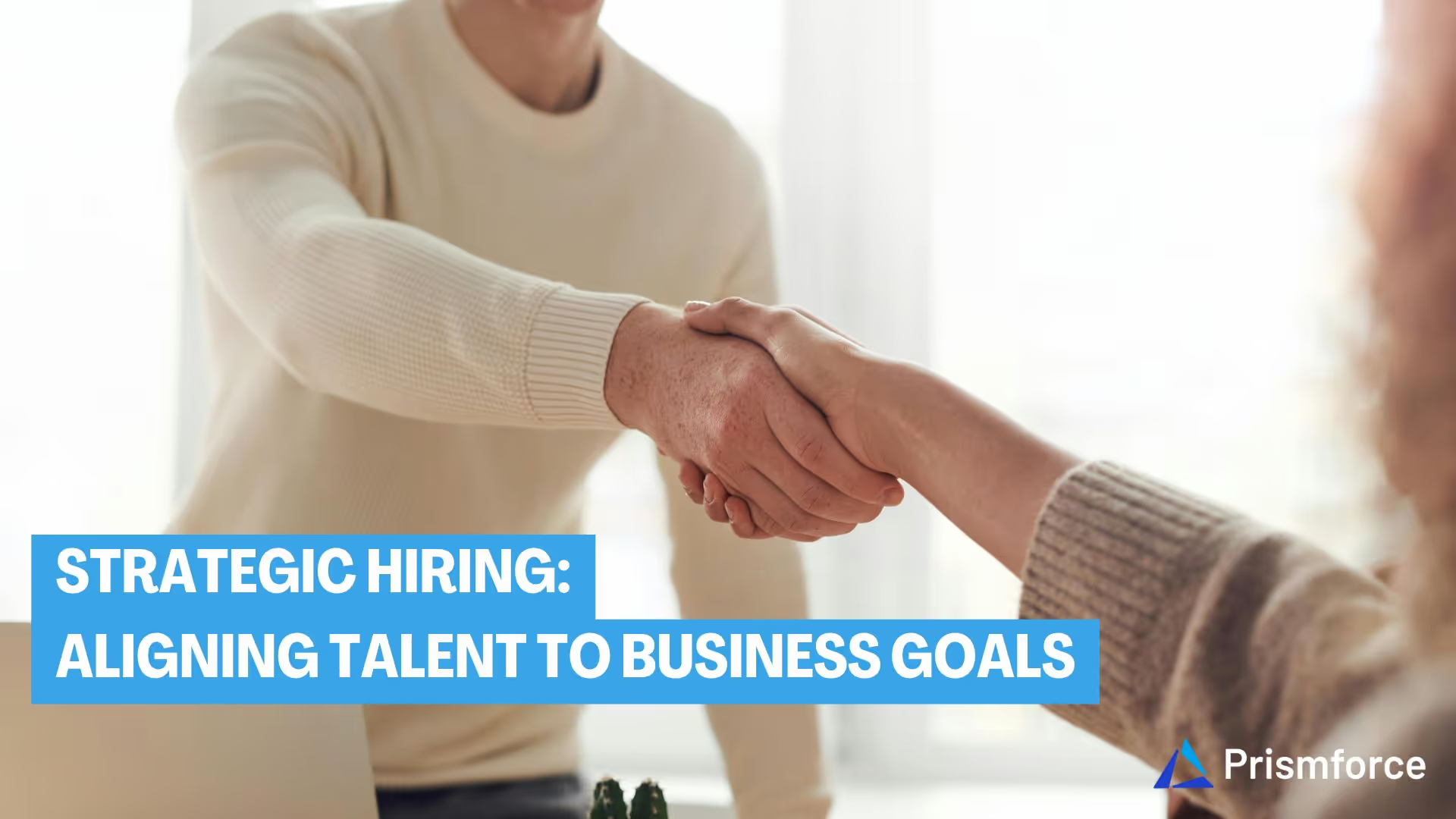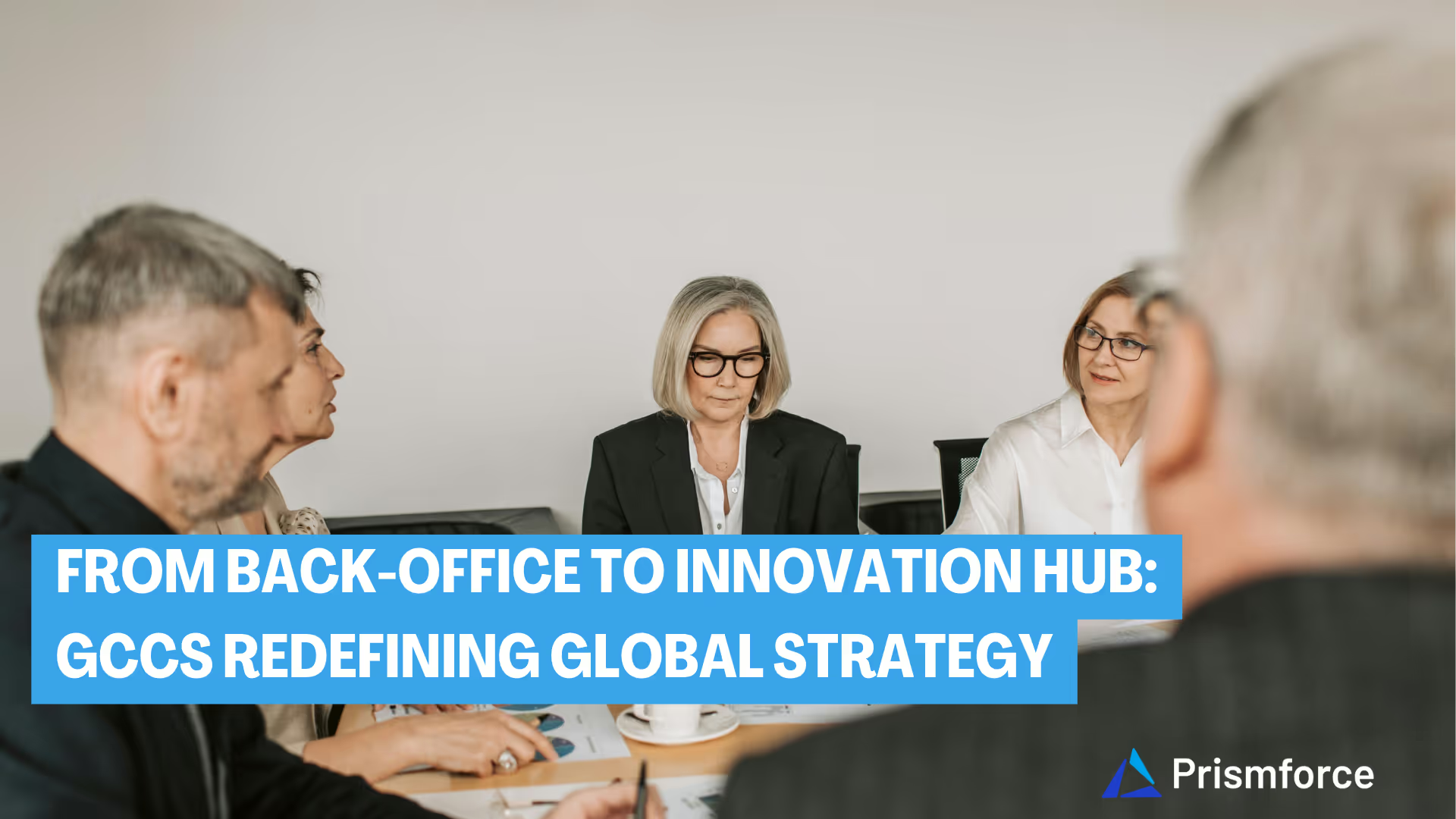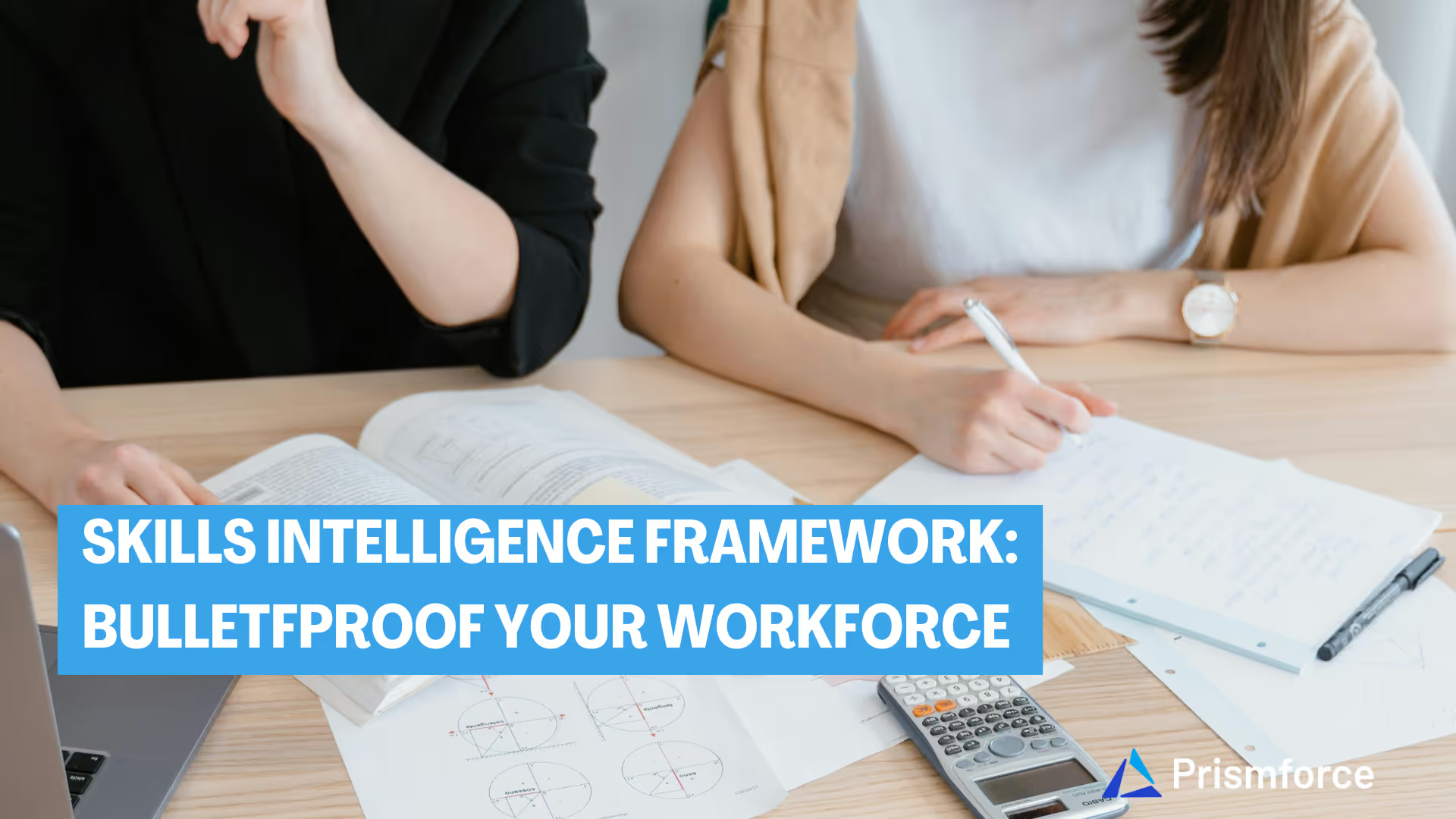.avif)
Already a couple of months into 2025, and the integration of Artificial Intelligence (AI) in HR technology is poised to revolutionize talent supply chain management, fundamentally altering how companies attract, develop, and retain top talent.
And this is not a new finding. According to the World Economic Forum (WEF), the enterprise sector of AI recruitment is set to grow at a CAGR of 6.17% between 2023 and 2030.
This transformation is not just a trend but a necessity in today's fiercely competitive business environment.
The concept of talent supply chain has gained significant traction in recent years, mirroring the efficiency and strategic importance of traditional supply chain management in production and logistics. Just as companies optimize their material supply chains to ensure smooth operations, they are now applying similar principles to their human capital. This approach views talent as a critical resource that flows through the organization, requiring careful planning, acquisition, development, and deployment to maximize business outcomes.
So how is HR going to evolve in 2025, and what are those possible signals that one should look out for? We took a look at the macro and micro trends that are going to play a significant role in how HR is going to evolve in 2025.
The Evolution of HR Tech: A Look Ahead to 2025
The HR technology landscape is undergoing a seismic shift, driven by the rapid advancement of AI and machine learning capabilities. By 2025, we can expect to see a dramatic transformation in how HR functions are performed and how talent is managed across organizations.
One of the most significant changes will be the widespread adoption of AI-powered HR platforms that can handle a multitude of tasks simultaneously. These systems will not only automate routine administrative work but also provide deep insights into workforce trends, employee performance, and organizational health.
Predictive analytics will become increasingly sophisticated, enabling HR professionals to make data-driven decisions about hiring, development, and retention strategies.
Another key development will be the integration of virtual and augmented reality technologies in HR processes. These immersive technologies will revolutionize employee training and development, allowing for realistic simulations of work scenarios and enhancing the onboarding experience for new hires.
Additionally, blockchain technology is expected to play a crucial role in verifying credentials and work histories, streamlining the hiring process and reducing fraud.
AI in Talent Acquisition: Revolutionizing Recruitment
The recruitment landscape is set to undergo a dramatic transformation with the integration of AI technologies. By 2025, AI-driven recruitment tools will have evolved to become indispensable assets in the talent acquisition process, fundamentally changing how organizations identify, assess, and attract top talent. A study by Harvard Business Review, in fact, found that companies that use AI in the hiring process are 41% more likely to make successful hires.
- Intelligent Candidate Matching: AI algorithms will analyze vast amounts of data to match candidates with job openings based on skills, experience, and cultural fit. These systems will go beyond keyword matching, understanding the nuances of job requirements and candidate profiles to suggest the most suitable matches.
- Predictive Performance Models: AI will enable recruiters to predict a candidate's potential performance and longevity within the organization. By analyzing historical data and patterns, these models will help companies make more informed hiring decisions.
- Automated Interview Scheduling and Screening: AI-powered chatbots and scheduling tools will handle initial candidate interactions, freeing up recruiters' time for more strategic tasks. Video interview analysis tools such as Vidcruiter will assess candidate body language, tone, and responses to provide objective insights.
- Bias Reduction: Advanced AI systems will be designed to identify and mitigate unconscious biases in job descriptions, resume screening, and interview processes, promoting more diverse and inclusive hiring practices.
- Personalized Candidate Experience: AI will enable highly personalized communication with candidates throughout the recruitment process, providing timely updates and tailored information based on individual preferences and stages in the hiring journey.
These innovations will not only speed up the recruitment process but also improve the quality of hires and enhance the overall candidate experience. As AI takes over more routine tasks, recruiters will be able to focus on building relationships with candidates and making strategic hiring decisions that align with organizational goals.
Optimizing Talent Supply Chain Management with AI
The integration of AI into talent supply chain management promises to bring unprecedented efficiency and strategic insight to workforce planning and development.
By 2025, organizations will leverage AI to create dynamic, responsive talent ecosystems that can adapt quickly to changing business needs.
AI-powered workforce analytics will provide real-time insights into skills gaps, employee performance, and future talent needs.
These systems will study internal and external data sources to forecast talent demand, identify potential skill shortages, and recommend strategies for addressing these challenges. This proactive approach will enable organizations to stay ahead of the curve in a rapidly changing job market.
AI-driven talent allocation is making it easier for organizations to match employees with roles that suit their skills, interests, and career goals. These systems analyze factors like project demands, individual expertise, and long-term aspirations to recommend the best team structures and career paths.
AI is also changing the way companies approach succession planning. By identifying employees with leadership potential early on, organizations can design personalized growth plans to prepare them for key roles. This data-driven approach helps build a strong leadership pipeline and ensures the company is ready for future challenges.
The Impact of Superworkers on Workforce Planning
The concept of "superworkers" – highly skilled individuals augmented by AI technologies – is set to reshape workforce planning strategies by 2025. These employees, equipped with AI-enhanced tools and capabilities, will be able to perform tasks that previously required multiple people or specialized expertise.
Organizations will need to recalibrate their workforce planning models to account for the increased productivity and unique skill sets of superworkers. This may lead to a shift in organizational structures, with flatter hierarchies and more project-based work becoming the norm. HR professionals will need to develop new frameworks for evaluating and compensating these high-impact employees.
The rise of superworkers will also necessitate a reevaluation of training and development programs. Companies will need to invest in upskilling initiatives that focus on developing employees' abilities to work alongside AI technologies effectively. This may include training in data interpretation, AI system management, and complex problem-solving skills that complement AI capabilities.
Moreover, the integration of superworkers into the workforce will require careful consideration of team dynamics and organizational culture. HR professionals will need to develop strategies for fostering collaboration between AI-augmented employees and their colleagues, ensuring that the benefits of these technologies are distributed equitably across the organization.
AI in Employee Experience and Retention
By 2025, AI will play a pivotal role in enhancing employee experience and improving retention rates. Intelligent systems will analyze various data points to create personalized employee experiences that cater to individual needs, preferences, and career aspirations.
- Personalized Learning and Development: AI-powered learning management systems will create tailored development plans for each employee, recommending courses, mentorship opportunities, and stretch assignments based on their career goals and the organization's needs.
- Predictive Retention Analytics: Advanced algorithms will analyze employee data to identify flight risks and suggest proactive interventions. These systems will consider factors such as engagement levels, performance metrics, and external job market conditions to predict potential turnover.
- AI-Driven Wellness Programs: Intelligent wellness platforms will use personal health data and behavioral patterns to provide customized health and well-being recommendations, helping to reduce stress and improve overall employee satisfaction.
- Automated Performance Management: Continuous feedback systems powered by AI will replace traditional annual reviews, providing real-time insights into employee performance and facilitating more frequent and meaningful conversations between managers and team members.
- Intelligent Career Pathing: AI will assist employees in mapping out potential career paths within the organization, suggesting skill development opportunities and internal job openings that align with their aspirations and the company's needs.
These AI-driven innovations will contribute to a more engaging and supportive work environment, leading to higher levels of employee satisfaction and loyalty. By addressing individual needs and providing personalized experiences, organizations can create a workforce that is not only more productive but also more committed to long-term success.
Challenges and Ethical Considerations
While the integration of AI in HR technology offers numerous benefits, it also presents significant challenges and ethical considerations that organizations must address as they move towards 2025 and beyond.
One of the primary concerns is data privacy and security. As AI systems collect and process vast amounts of personal employee data, organizations must implement robust safeguards to protect this sensitive information from breaches and misuse. Transparency in data collection and usage will be crucial to maintaining employee trust and complying with evolving data protection regulations.
Another challenge lies in ensuring the fairness and unbiased nature of AI algorithms. There is a risk that AI systems may perpetuate or even amplify existing biases in hiring, promotion, and performance evaluation processes. Organizations will need to invest in regular audits and adjustments of their AI systems to ensure they promote diversity and inclusion rather than hinder it.
The potential displacement of certain HR roles due to AI automation is another consideration. While AI will create new job opportunities, it may also lead to some traditional HR roles becoming obsolete. Organizations will need to manage this transition carefully, focusing on reskilling and redeploying affected employees.
Ethical use of AI in employee monitoring and performance tracking is also a critical issue. While AI can provide valuable insights into employee productivity and engagement, there is a fine line between helpful analytics and invasive surveillance. Companies must establish clear policies and obtain employee consent for data collection and analysis to maintain a culture of trust and respect.
Lastly, the reliance on AI for decision-making in HR processes raises questions about accountability and human oversight. Organizations must establish clear guidelines for when and how AI recommendations should be implemented, ensuring that human judgment remains a crucial part of important HR decisions.
Preparing for the Future: How Companies Can Adapt
In 2025, organizations must take proactive steps to prepare for the AI-driven future of HR technology and talent supply chain management. Here are key strategies companies can adopt to stay ahead of the curve:
- Invest in AI-Ready Infrastructure: Develop a strong technological foundation that can support advanced AI applications. This includes upgrading data management systems, enhancing cybersecurity measures, and ensuring scalability for future growth.
- Foster a Data-Driven Culture: Encourage decision-making based on data and analytics across all levels of the organization. Provide training to employees on data interpretation and the use of AI-powered tools.
- Develop AI Expertise: Build an internal team of AI specialists or partner with external experts to guide the implementation and management of AI technologies in HR processes.
- Prioritize Ethical AI Development: Establish clear ethical guidelines for AI use in HR, focusing on transparency, fairness, and employee privacy. Regularly audit AI systems for bias and unintended consequences.
- Redesign HR Roles and Competencies: Redefine HR job descriptions to incorporate AI-related skills and responsibilities. Invest in upskilling programs to prepare HR professionals for their evolving roles as strategic partners and AI system managers.
- Embrace Agile HR Practices: Adopt agile methodologies in HR processes to quickly adapt to changing technologies and workforce needs. This includes implementing continuous feedback systems and flexible talent management strategies.
- Collaborate Across Departments: Foster close collaboration between HR, IT, and other departments to ensure seamless integration of AI technologies across the organization.
- Engage Employees in the Transformation: Communicate openly with employees about AI initiatives, addressing concerns and highlighting the benefits. Involve them in the design and implementation of new systems to increase buy-in and adoption.
- Stay Informed on AI Advancements: Continuously monitor developments in AI and HR technology to identify new opportunities and potential disruptors. Attend industry conferences, participate in professional networks, and engage with thought leaders in the field.
- Pilot and Iterate: Start with small-scale AI pilot projects in specific HR functions, learn from the results, and gradually expand successful initiatives across the organization.
By taking these steps, companies can position themselves to leverage the full potential of AI in HR technology, creating more efficient, effective, and employee-centric talent supply chains that drive organizational success in the years to come.
Upskill Your HR Team to be on Top of their Game with Prismforce
As we stand at this pivotal moment in 2025, AI isn't just reshaping talent supply chain management—it's revolutionizing how tech services companies operate at their core. The innovations we've explored demonstrate how intelligent platforms like PrismForce are transforming traditional HR processes into strategic advantages, helping organizations predict skill demands, reduce bench time, and ensure perfect project-talent matches with unprecedented accuracy.
The impact is clear: companies leveraging AI-powered talent supply chain solutions are seeing dramatic improvements in their key metrics. PrismForce's clients, for instance, report up to 4-5x improvement in skills discovery and 80% talent supply chain automation. These aren't just statistics—they represent a fundamental shift in how leading organizations are winning the talent game in an increasingly competitive market.
Whether you're grappling with resource allocation challenges or seeking to transform your entire talent strategy, the future of HR tech is here. Take the first step toward modernizing your talent supply chain by exploring how PrismForce's AI-driven solutions can help you turn your workforce into your strongest competitive advantage. Scroll up to discover the specific innovations that are making this transformation possible and learn why industry leaders are making the switch today.
FAQs
Q1. How is AI transforming talent acquisition in HR?
AI is revolutionizing recruitment by automating resume screening, interview scheduling, and candidate identification. It also uses predictive analytics to forecast hiring needs and assess cultural fit, making the talent acquisition process more efficient and effective.
Q2. What is the role of AI in employee experience and retention?
AI-powered platforms are being used to track employee engagement levels, identify burnout risks, and create personalized professional development paths. This helps companies improve employee satisfaction and increase retention rates.
Q3. What are "superworkers" and how do they impact workforce planning?
Superworkers are employees who combine technical expertise with soft skills. They demonstrate enhanced productivity, cross-functional capabilities, and strong adaptability to technological changes. Their emergence is prompting companies to reassess traditional workforce planning models.
Q4. What ethical considerations arise from implementing AI in HR processes?
Key ethical concerns include data privacy, algorithmic bias, and fair treatment of candidates. Companies need to develop robust frameworks to ensure AI systems make decisions that are both efficient and equitable.
Q5. How can HR professionals prepare for the future of HR tech?
HR professionals should focus on building AI literacy while maintaining human oversight in critical decisions. They need to develop new skills and competencies, shifting towards more strategic responsibilities as AI handles routine tasks. Continuous learning and adaptation are crucial in this evolving landscape.





